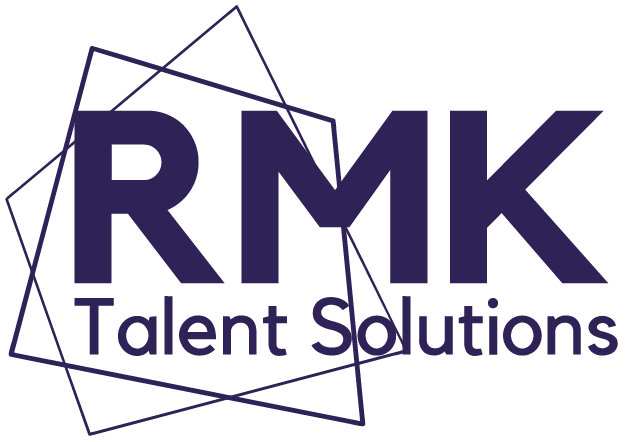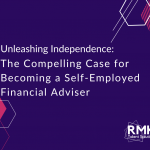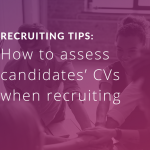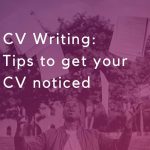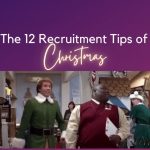Writing a CV can be a bit of a head-scratcher, you find yourself staring at the white abyss that is your computer screen and the dreaded blinking cursor taunting you. The reality is cv writing doesn’t have to be complicated. Your CV should always be clearly formatted and short enough for a recruiter to scan quickly – and most importantly – tailored to the role you’re applying for.
Here are some basic rules and top tips to get your CV noticed:
Make your cv match the job description
Let’s say you are applying for a Team Leaders Position, when you look at the job advertisement it will include a job description and person specification.
Look out for keywords, let’s say they are looking for someone who is passionate about investment management and technology. In the key skills and attribute section of your cv, you should make sure you include something that matches the description and that could be:
“I am passionate about working in investment management and understand the importance of delivering quality services to clients”
Load your cv with powerful keywords and phrases
Nearly every recruiter and hiring manager will be using recruiting software to scan your resume. So, it’s important you’re using the right resume keywords.
Keywords to include:
- Professional
- Enthusiastic
- Loyal and hardworking
- Trustworthy
- Customer focused
- Flexible
- Innovative
- Conscientious
Keep your CV short and sweet
One of the most important tips that a lot of people fail to follow. Employers will be going to get scores of CVs for every single job that is advertised. And the last thing they need to do is to sift through 100’s CVs that are four or five pages long. Your CV should only be a couple of pages, but it needs to be loaded with relevant information.
Information you should include on your cv:
Personal Details
Include your name, address, number and email – make sure your email has a good extension for example name@emailprovider.com avoid including xx, numbers and shorten nicknames, make sure, it looks professional and don’t forget to check your emails daily.
Personal statement
The personal statement section is one of the most important sections of your CV, this is the decision maker on whether you have grabbed the recruiter/employer’s attention.
Your personal profile or personal statement is the most crucial element of your CV, it is the first thing they will read about you and ultimately the decision maker on whether you have grabbed the recruiter/employer’s attention.
Remember those keywords to help you get noticed that we mentioned earlier, take a look at this personal statement example below:
Example CV Personal Statement
‘I am a highly motivated Advisor Team Leader with over 7 years of experience in all areas from delivering day-to-day support from intermediary clients to providing quality training to maximise users’ experience. Most recently, I have trained and developed a strong culture within our adviser support team, whilst taking a hands-on approach when dealing with clients on a regular basis.
I can be trusted to provide exceptional customer service, both face-to-face and via the telephone, whilst also assisting the business to grow and improve overall sales. I am an outstanding team player, innovative in my approach to work whilst also taking immense pride in fulfilling my responsibilities for my employer.
I am flexible, conscientious, trustworthy and enthusiastic about my work. I can be relied upon to deliver everything that I set out to achieve, ensuring that it is completed to a high personal standard and within given timeframes.’
This is a great personal statement example; it gives a good first impression. Reading this would you want to interview this person?
Skills and Achievements
The achievement section of your CV gives you the chance to show how your previous experience has given you the skills needed to make you a suitable candidate. List all your relevant skills and achievements (backing them up with examples) and make it clear how you would apply these to the new role.
Education
Your educational experience and achievements should be listed here, along with dates, the type of qualification and/or the grade you achieved – although the specific parts of education that you include in your CV will depend on your individual situation. For example, if you have more educational achievements than work experience, placing an emphasis on this section is a good idea.
If you have been in employment for a while, you are likely to have developed an extensive portfolio of work experience, if this is the case you should still include your education but detailed descriptions aren’t necessary; condense information into short lists, with grades and courses.
If you undertook a professional qualification to brush up on your knowledge in an industry or learn something, providing more detail would be beneficial as it demonstrates your dedication in the field.
If you have just left university focus on your degree rather than GSCE qualifications. You should also structure your CV differently prioritising your degree and education section, work experience should come secondary to education.
Experience
The work experience section is straightforward, simply list the most recent first. Include your job title, the name of the organisation, time in post, and your key responsibilities.
References
It is ok to put ‘References Available Upon request’ If you have gone that extra mile and found someone who has agreed to provide you with a reference, put their name and contact details. This is more powerful as it gives your CV greater credibility.
Frequent questions
Should I Include a photo on your CV?
There isn’t one right answer to the question of including a photo on your CV, however Including a photo can make the quest for bias-free recruitment more challenging. Discrimination is a contributing factor, the reason to exclude photos is to protect applicants from being discriminated against, and employers from allegations of discrimination, based on race, age, weight, gender, attractiveness, or personal style.
However, there are other ways you can get employers to view your picture without having to add your photo to your resume.
Include a link to your LinkedIn Profile
LinkedIn profiles regularly incorporate a photo and are widely utilised by candidates in their job search and by recruiters sourcing talent. If you believe your appearance would be an asset for your target job, incorporating a link to your LinkedIn profile on your resume is a safe and acceptable way to highlight your appearance.
Should I include my hobbies and Interests?
If your hobbies and interests don’t add value, then leave them out. If you decide to include them, make them relevant to the role you’re applying for.
Example of interest section of a CV:
‘In my spare time, I enjoy going to the gym and regularly partake in charity runs around the UK to help the community and to stay fit and healthy. I also enjoy keeping up to date with current affairs, both national and international events, which helps me to get inspiration for the stories that I produce when I am working.’
Hobbies can carry a deeper message; prospective employers will be subconsciously asking themselves when reading through the candidate’s cv:
‘What does “I enjoy going to the gym and regularly partake in charity runs”, “I enjoy staying up to date with current affairs” tell me about this candidate?’
The hobbies and interests you include on your CV can reveal a lot of information about you and your personality.
Here are some examples of some hobbies and interests and what they tell employers about the candidate:
| Computing | Is technical-minded and good with technology, may also be introverted |
| Swimming |
Keeps fit and healthy |
| Solving puzzles | Has excellent problem-solving and analytical skills and likes to overcome challenges |
| Playing Football/Soccer |
Has team-working skills; enjoys the company of other people |
| Playing chess | Is intelligent, a strategist and deliberates before taking action |
| Mentoring | Are a team player who has good communication and interpersonal skills |
| Playing squash |
Is highly competitive and motivated |
| Reading | Is intelligent, likes learning new things, is open-minded and analytical |
| Writing |
Is creative, artistic and/or passionate |
| Going to the gym |
Is conscious of their health is fit and motivated to accomplish goals |
| Travelling | Is outgoing, social and adventurous |
And there you have it!
If you would like to learn more about our services and how we can help support your job-searching journey, get in touch here:
Looking for a new career?
Check out our latest vacancies here: https://rmktalent.com/job-openings
Hiring and in need of top talent?
If you would like to learn more about how our talent assessment tools can help you hire the perfect candidate click on the link below or get in touch to find out more about our recruitment services: https://rmktalent.com/
